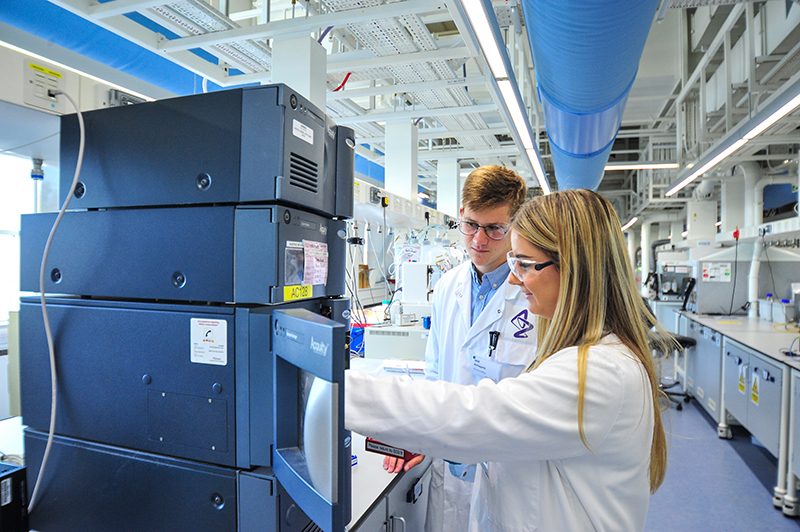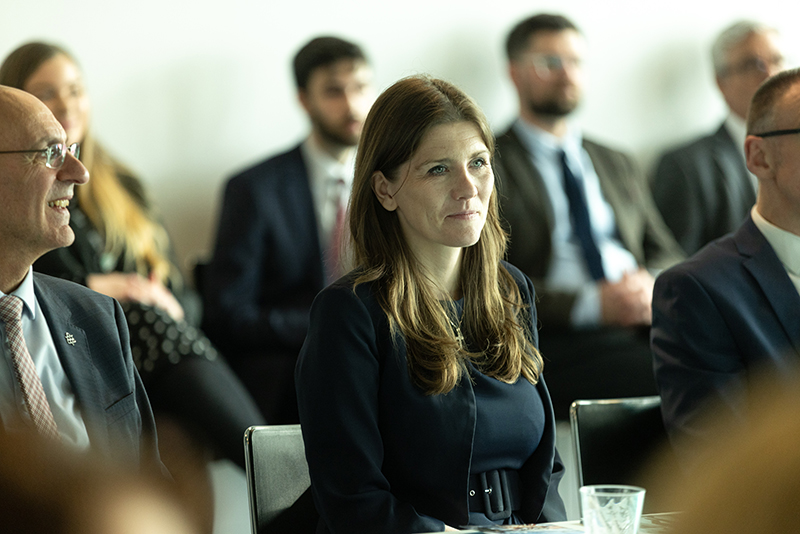Building future skills
Universities used to be places where you studied for three years to get a degree before hopefully moving on to get a job. If you were really adventurous, you went on a “sandwich course” and spent a year out in industry earning some money and getting some real-life experience.
But while those traditional routes to a degree still exist, a university education is about so much more now. It is about creating pathways to develop skills, it’s about recognising the specific needs of industry, it’s about increasing opportunity – in government parlance, it is about levelling up.
The Government’s levelling up plans set several key ambitions, one of which is to increase the number of people successfully completing high-quality skills training significantly. Universities have a key role to play in ensuring education pathways are in place to support levelling up, not just in delivering high-quality skills, but also in enhancing life chances for all those with potential.
Foundations were laid for future skills learning by the Augar Report – or to give its full title, The Independent Panel Report to the Review of Post-18 Education and Funding – in 2019.
While the debate may have focused around potential cuts in tuition fees, the panel chaired by Sir Philip Augar looked far wider at how pathways to continuous learning can be created. Central to that was the concept of lifelong learning.
Lifelong learning
In September 2020, the Prime Minister announced plans to introduce a Lifelong Loan Entitlement (LLE) as part of the Lifetime Skills Guarantee. The LLE will provide everyone with a loan entitlement to the equivalent of four years of post-18 education to use over their lifetime. The idea is to give people the opportunity to study, train, retrain and upskill throughout their lives to respond to changing skills needs and employment patterns.
At a recent event held by WonkHE, an organisation which provides expert analysis, debate and insight within the university sector, Sir Philip said: “We can reboot the life opportunities for the vast majority of the population who don’t have a degree and the 50 per cent or so of young people who don’t go to university.
“This is an immense opportunity to reskill, an opportunity that will be required through the changing nature of the workplace. It would be transformative for an economy and a society which is going to be radically different.”
He added: “There will be more of a focus on internally generated skills resources and if universities are able to think this through and plan ahead for 2025, and work with local employers, this is actually a hugely important growth area. What excites me about the whole thing is that for the first time ever we have a properly integrated, connected passage through tertiary education from 18 through to 80.”

The LLE will not be formally introduced until 2025 but Manchester Met is one of 22 institutions awarded funding from the Office for Students – the independent regulator of higher education in England – to deliver short higher education courses through LLE from September 2022.
The project will provide access to the University’s award-winning RISE programme with the aim of providing skills to people in employment without a degree, to reduce barriers to their career progression.
Degree apprenticeships are a growing part of our skills revolution
Professor Malcolm Press CBE, Vice-Chancellor, sits on the board of Universities UK, the body which represents 140 universities across the UK, and is its strategic lead for LLE.
Prof Press said: “The LLE will give everybody the opportunity to achieve their potential, to develop and constantly redevelop. It will also ensure businesses in the UK have access to the skills base they need.
“As a sector we have an opportunity to shape what it looks like. We have the flexibility to develop an approach that we think will work based on our experiences.”
With the plan for LLE to enable people to learn via a series of short courses there is a need to build a structure around the learning pathways to realise its full value.
He added: “If people are going to be studying over a longer period of time, they are unlikely to do one module in Aberdeen and the next in Plymouth. They might, but the likelihood is here in Greater Manchester there’ll be a dozen institutions where people might go to do these modules.
“What we provide to our current students is so much more than teaching, learning and assessment. There is a massive wrap-around in terms of supporting, developing and enabling students to succeed and I don’t think the LLE will work without that component.
“I like the idea of a home institution that curates the learning. It needs curating to ensure we demonstrate the value of the learning to employers. It’s really important that employers understand the qualification that comes from it otherwise, we’re presenting them with a myriad of complexity.”
He also explained the role LLE has in the wider skills agenda. “It’s about focusing on areas where there is sector demand and trying to grow demand from learners to take advantage of that jobs market – for example digital, data, creative, health. Those are the areas where there is a regional and national need.

“By creating that demand, by bringing together the interests of the employers, the interests of the providers and the aspirations of the learners, that is how you will really deliver success.”
And it is identifying this demand – and delivering the pipeline of skills and talent – that has been core to Manchester Met’s vision for several years.
The creation of the School of Digital Arts (SODA), a £35m joint investment between the University and Greater Manchester Combined Authority, was a direct response to the need to provide a workforce with digital skills to drive the burgeoning creative and digital sector in Greater Manchester.
Degree apprenticeships
And the University was at the forefront of the introduction of degree apprenticeships in 2015 and the recently published Force for Change report demonstrated how those “learn while you earn” routes to a degree were delivering on their promises.
Manchester Met is now working with more than 500 employer partners, including AstraZeneca, Barclays, Lloyds, IBM, McDonald’s and United Utilities, and has admitted more than 2,500 apprentices since 2015.
Gaetan Moore, Leadership, Talent and Governance Manager with United Utilities explained the benefit to employers of using Manchester Met’s degree apprenticeships to develop skills vital to the continued growth of an organisation.
Moore said: “The reason we decided to take on apprentices is that at United Utilities we realised we had a few roles, very specific and very critical to our business that needed some support in terms of development. We were finding it difficult to recruit externally so we decided to look for hidden internal talent and develop our people through the programme.
“We could see a direct impact on our organisation, through the best practice employees learned on the programme, and the opportunity to practice the skills they’ve been taught at Manchester Met.
“The combination of the academic education together with the on-the-job learning makes a very important difference.”
The Government recently announced a £750 million investment into delivering high-quality teaching, facilities and equipment and expanding the UK’s provision of high-cost, high-return subjects that will in turn drive the economy in the future. This included the growth of strategically important STEM subjects, and the “turbocharging”, to use the words of Minister for Higher and Further Education Michelle Donelan MP, of degree apprenticeships.

And Manchester Met plans to help deliver on her call to turbocharge degree apprenticeships with ambitious plans to increase numbers by 50% by 2026.
Donelan recently visited the University, meeting degree apprentices and major public and private sector employers to learn how its degree apprenticeship programmes in subjects from Digital Marketing to Healthcare Science support the Government’s levelling up agenda.
Donelan said: “The days of old-fashioned snobbery around vocational education are over. Apprenticeships are key to levelling up opportunity across the country and should carry the same esteem and sense of pride as traditional academic routes.
“Degree apprenticeships are a growing part of our skills revolution, and I am delighted that the number of apprenticeships with a mandatory degree component has nearly doubled since 2018/19.
“Manchester Metropolitan University gives me confidence that such impressive growth can continue. With more than 2,500 apprentices and over 500 industry partners, the university has set a high bar for degree-level apprenticeships and offers a blueprint for success to other providers.”
The Force for Change report found degree apprenticeships are:
• Directly supporting young people – More than a third of the University’s apprentices are aged 20 or under and more than half are aged 24 or under when starting the programme.
• A powerful vehicle for social mobility – Overall, 40% of Manchester Met degree apprentices are the first generation in their family to go to university.
• Increasing opportunities for people from disadvantaged backgrounds – According to Index of Multiple Deprivation (IMD) data, 36% of all Manchester Met apprentices are from the most deprived areas.
• Increasing opportunities for students from diverse backgrounds – Manchester Met cohorts are becoming more ethnically diverse, with an increase in Black, Asian and minority ethnic apprentices, from 10% in 2015-16 to 19% in 2020-21.
• The report also shows the impact on degree apprentices themselves, with the proportion of those who pass their apprenticeship at Manchester Met being 83%, which is significantly higher than the national undergraduate average of 64%.
• In addition, 78.3% of Manchester Met degree apprentices received a pay rise and 64.2% received a promotion during their apprenticeship.
